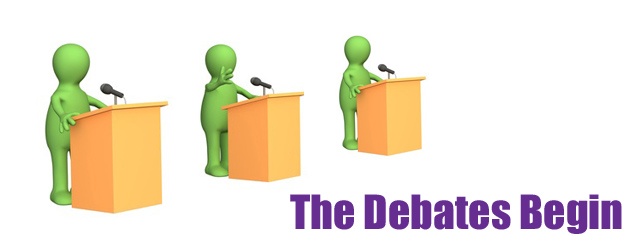Debate Laughter Can Improve Politicians’ Standing, UA Researcher Finds
by August 5, 2015 4:20 pm 257 views

It has been said that laughter is the best medicine.
It may also help politicians get their points across in a hyper-partisan nation, a University of Arkansas political science professor reported in a recent research paper.
Patrick A. Stewart has spent nearly a decade studying the issue and recently published a study in Presidential Studies Quarterly.
Stewart analyzed six 2012 Republican Party primary debates for his study and found that venue and speaking time directly affect applause and laughter.
Further, Stewart found that laughter benefited secondary candidates more than front-runners in televised debates by improving their likability among viewers. Debate venues also play a significant role in determining applause.
“Laughter is honest, it tells us what the audience is really thinking, who they are really supporting,” Stewart said, noting that instructing live audiences of televised debates to hold their applause can skew public perception of a candidate’s popularity.
Stewart, who was a professor at Arkansas State University before going to the University of Arkansas, said while politics have a lot of positives, it has taken a focus on the negative in recent years.
While at ASU, Stewart worked as an assistant rugby coach. He said the coaches there used humor to get players ready and the work translated to a very successful program.
As for politics, Stewart said television has helped create a more visceral, emotion-laden medium for politicians to use. However, the medium helps voters see candidates in a familiar way whether voters like them or not or even if they are like our family, Stewart said.
A presidential candidate like Republican Donald Trump provides an example, Stewart said.
Trump’s television show on NBC, The Apprentice, put him in living rooms every week, with Trump having the final say and editorial control over the show and his image. This connection, in part, has helped Trump’s popularity rise as a candidate in 2016.
Another media-savvy candidate is former Gov. Mike Huckabee, R-Ark., Stewart noted.
“He knows retail (politics) and mass media,” Stewart said. “However, it can sometimes backfire (on him).”
Trump and Huckabee will be among the 10 GOP Presidential debate participants in Thursday night’s televised debate on Fox News.
STUDY
Stewart – an expert in non-verbal communication and trained to analyze facial movements as a certified Facial Action Coding System coder – said he studied the 2012 Republican presidential debates, using content software to analyze video in five to 12 minute increments.
While candidates who were either frontrunners or raised a lot of money received the lion’s share of questions, the use of laughter was an effective tool for the non-frontrunner candidates.
“Laughter is a robust indicator,” said Stewart, who began researching how debates help leaders and their audience to develop a connection after the presidential election in 2008.
Stewart said the study showed that frontrunners typically do not need to take chances, while candidates in the second-tier were more likely to roll the dice with jokes.
However, Stewart said while people get to see candidates face-to-face on television, nothing compares to being able to see the candidate on the stump.
Other takeaways from Stewart’s research on the subject included:
- Although policy positions certainly play a role in candidate assessment, during debates they take a back seat to viewer evaluation of candidate performance, with primary debates focusing on policy less and character more than general election debates;
- Furthermore, primary debates are much more raucous affairs than general election debates, with substantially more applause and laughter. Specifically, Stewart found nearly two and four times more audience laughter, respectively, in pre-primary and primary debates when compared with the general election debates during the 2008 presidential election.
- Trailing candidates’ attempts to gain audience support through their humorous comments, which through the effect of laughter emotionally bonds the audience to them, can catapult the candidates into contention for leadership.
PAST
In the past 50 years, there have been several politicians that have gone on television shows to talk about issues or let voters see another side of them.
Former President Bill Clinton played “Heartbreak Hotel” on the saxophone on the Arsenio Hall Show in 1992, while former California Gov. Ronald Reagan went on the Tonight Show with Johnny Carson in 1975 to talk about a balanced budget amendment as he was considering challenging then-President Gerald Ford in 1976.
Reagan went on to defeat former President Jimmy Carter in 1980 and served two terms in the White House.
Stewart said Reagan was an interesting case study in being able to communicate and connect with voters.
“He would have his speechwriters come up with three to six pages of jokes (before each speech),” Stewart said, noting Reagan would choose jokes that were appropriate for the audience.
